From “racing royalty”, Clare Balding has become a household name. Kate Johnson talks to her about her new book, the upcoming Tokyo Games and those who influenced her career
WHEN the young Clare Balding’s teacher, Mrs T, asked the class what they’d all like to be when they grew up, Clare’s hand shot up and she answered brightly, “An eventer.”
Mrs T responded, “Oh, that’s interesting, what do you want to invent?”
It wasn’t the only time she felt misunderstood, and it’s just one of the tales that she recounts in her new book about resilience, Fall Off, Get Back On, Keep Going. It’s ostensibly for children aged nine to 12, but like all good children’s books, it’s useful and entertaining for adults too and packed with inspiring case studies of successful athletes, personal anecdotes, friendly tips and advice.
Clare wrote the book because “I wanted to tell stories about my childhood that would have helped me if I could have read them; that classic thing of, ‘I wish I’d known when I was 11 or 12 that it doesn’t matter if you’re different.’”
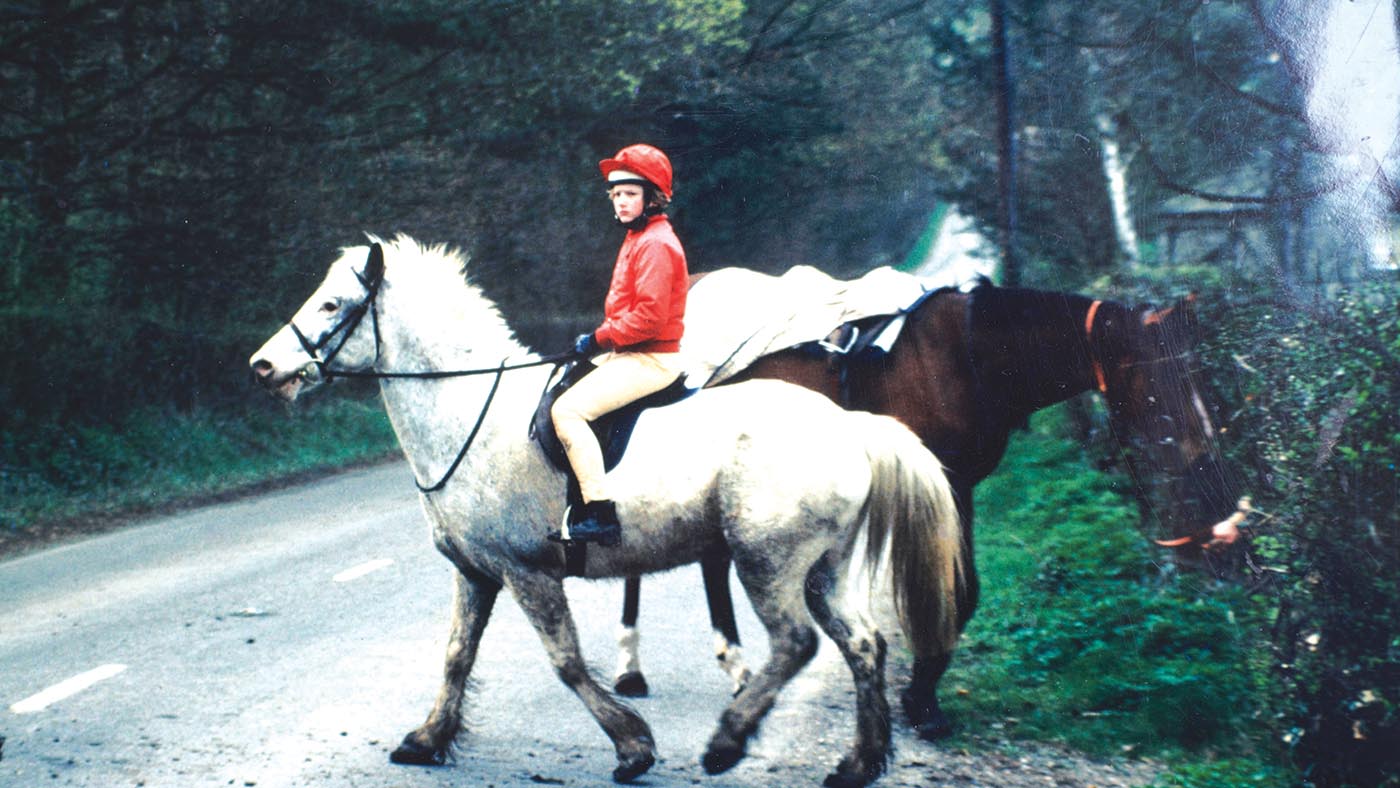
Clare Balding On Frank Her First Love – Clare Balding personal photo from her book Heroic Animals
She’s candid and (also in the book) she shares a prime example of what she’s talking about. Had she known that “you don’t have to change your behaviour to make yourself fit in, just stick with it, it’ll be all right, look for things you can do that make you feel confident”, she might not have tried so hard to infiltrate the cool gang, which resulted in her being suspended from school for shoplifting.
She says this was her “absolute rock bottom; the sense of shame was massive and feeling that everyone’s talking about you – not in a good way – and you don’t have a single friend in the universe and no one understands, your parents don’t understand.”
All these decades on, she says, “I still remember that, it still makes me shudder and in a way it’s a good thing – nothing is ever going to be as bad as that.”

10 Jan 1998: Ian Balding and Claire Balding at Sandown Racecourse
It’s a mark of her own resilience that she has turned such humiliating experiences into positives, a “fantastic life”, with a fulfilling, successful career and happy home, married to Alice Arnold.
“It’s really important to be touched with that vulnerability and sense of shame,” she says. “As you get older, you do find people who understand or you work with professionals who are used to things going wrong and therefore support and help you, and you try to improve. And, there is tomorrow – you can always put it right.”
IT’S the same quality that she most admires in the world-class athletes she meets, too.
“Because of the world I live and work in, I see a lot of sports people who are by their nature resilient, and everybody talks about their talent and their drive, but they very rarely talk about their resilience, because it’s seen as the boring bit,” she says. “I think that’s the most interesting bit; being really fully committed to something and therefore you’re going to work at it whatever the results – that’s difficult and important to learn.”
With such admiration, it’s no surprise that she’s “hugely excited” about Tokyo 2021, both the Olympics and Paralympics.
“I love it for the breadth of sporting content; athletics, swimming, rock climbing, karate making its debut, surfing… and equestrian events have a very special place in my heart because that was my drive.
“When I was a kid, all I wanted to be was an eventer and represent Great Britain at the Olympics.” (As she tried to tell Mrs T all those years ago.)
Clare loves the unpredictability of the equestrian events, how they will always throw up something exciting.
“I don’t think anyone outside of horse sports understands how difficult it is to win a medal – it’ll be even harder with only three in the team – how many things can go wrong,” she says.
This sport, at this level, clearly touches a nerve for her; so much so that at the Sydney Olympics, when Great Britain won the silver in team eventing she “was in floods of tears standing watching the medal ceremony”.
When Tina Cook, the travelling reserve who was working with her, asked why she was crying, she just about managed to sob, “It’s so moving.”
“And we hadn’t even won gold!” she points out.
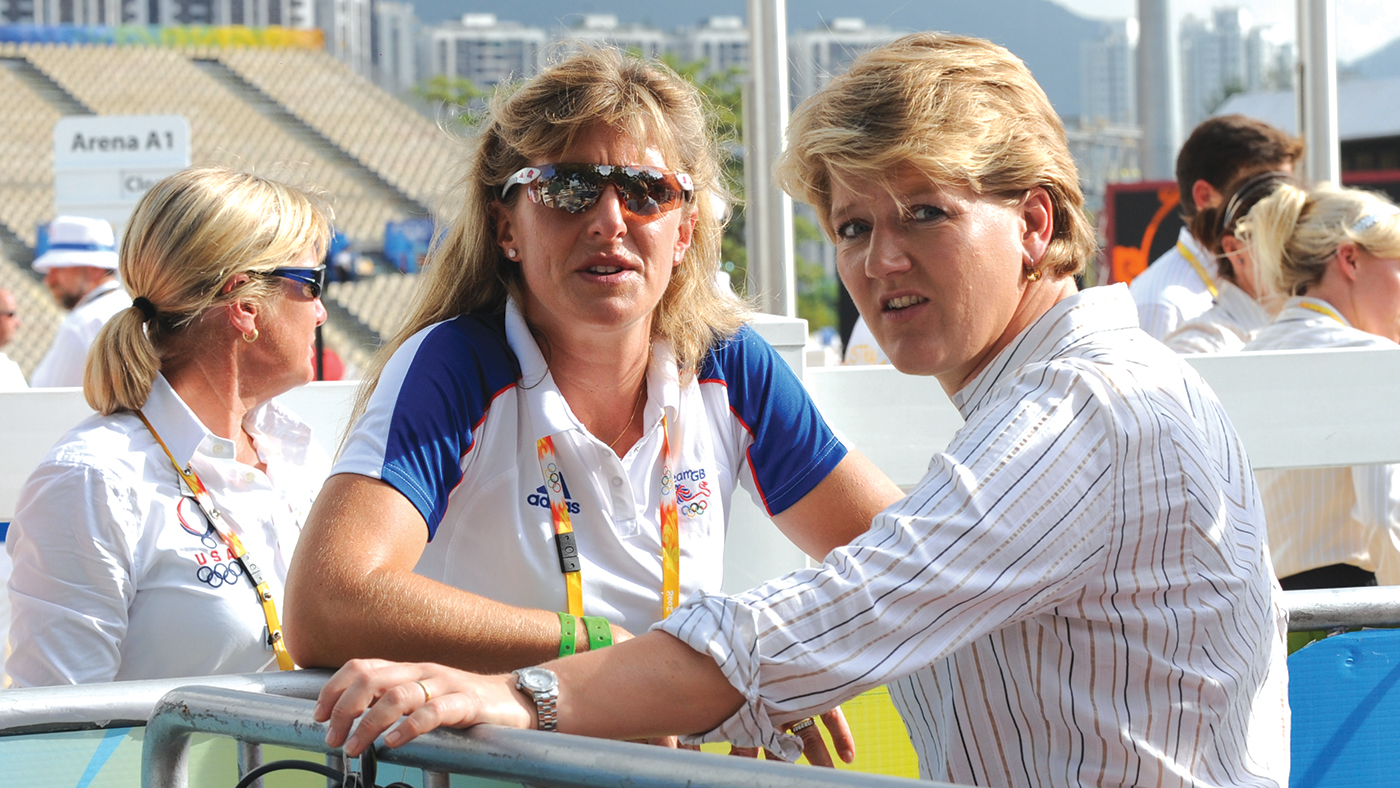
Tina Cook and Clare Balding at the 2008 Beijing Olympics
By the time of London 2012, tears or no tears, she correctly predicted that dressage would be the dark horse of the Olympics. The moment when she realised, “Wow, this is a different level,” was when she was going through Heathrow airport, and the security guard checking her bag said to her, “I watched that black horse dancing, I’ve never seen anything like it.”
WITH the mighty Valegro now enjoying retirement, Clare’s looking forward to seeing what Charlotte Dujardin can do next as her relationship with Mount St John Freestyle builds.
Anyone else she’s excited to see? The 21-year-old showjumper Harry Charles. Clare points out that he has new, high-profile rides since owner Ann Thompson recently announced that she was sending top-class horses including the stallion Romeo 88 and Gelano to Harry’s family stables in Hampshire.
Clare admires his “fantastic pedigree and background” – referring to his father, the 2012 Olympic team gold medallist Peter Charles, and his showjumping sisters Sienna and Scarlett – plus Harry’s understanding of the “nature of sport” and his star quality.
“There’s a dash of something special about him,” she says.
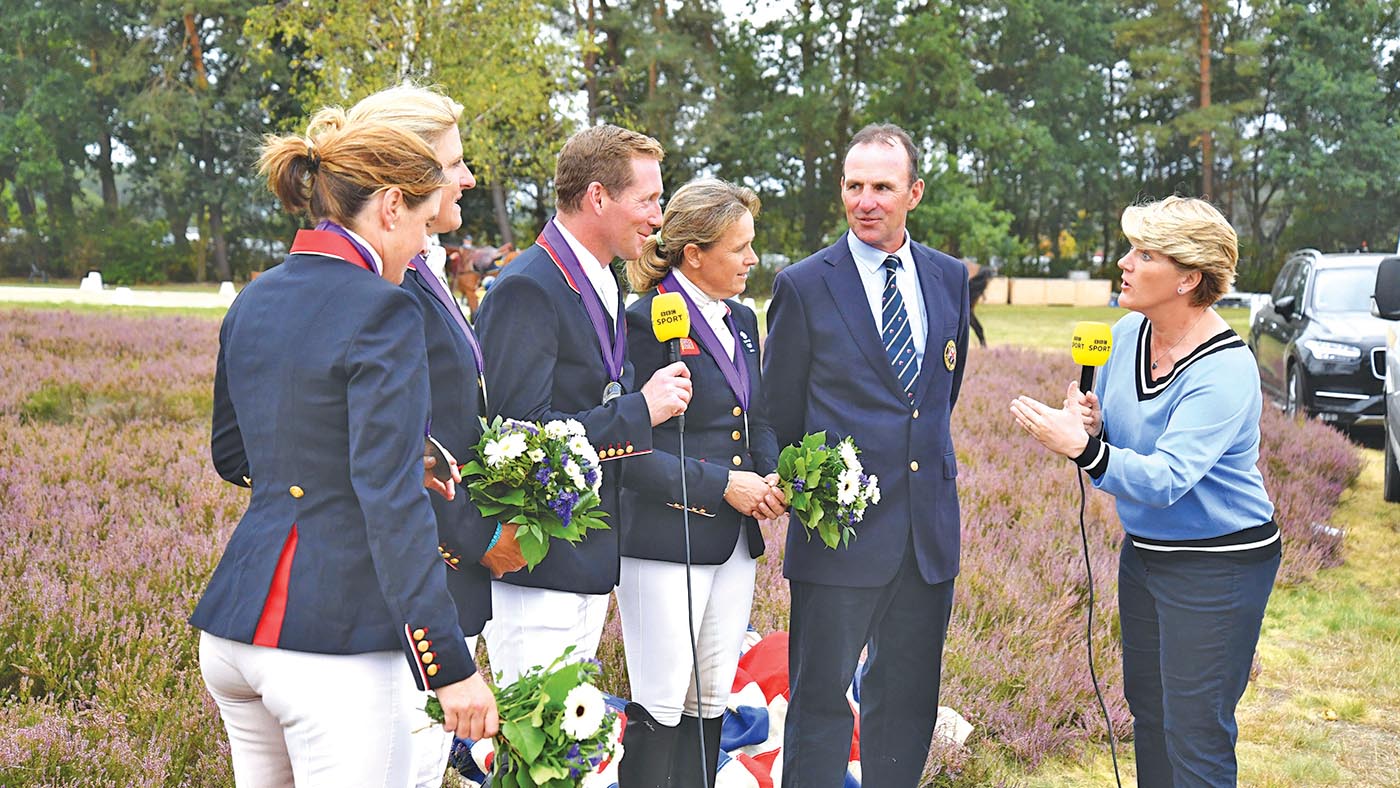
Clare Balding interviews the British team at the 2019 European Eventing Championships in Luhmuhlen, Germany
And as for racing, she says: “I would more than anything want to see Hollie Doyle and any other female jockey get a ride in the Derby. For all that racing says opportunity is equal, it isn’t that equal. Female jockeys don’t get many rides in the best races on well-fancied horses.
“Hollie’s been working a lot on her physical strength, and because she doesn’t have to lose weight she can bulk up, muscle-wise, so pound for pound she’s stronger than anyone.”
Hollie’s good fortune in being born the right size for racing wasn’t the experience that Clare had as a fledgling amateur. She started very young, as befits being from what you could call racing royalty. Her now-retired father Ian not only trained horses for The Queen among others, but guided the legendary Mill Reef to victory in the 1971 Derby, King George VI and Queen Elizabeth Stakes and the Prix de L’Arc de Triomphe.
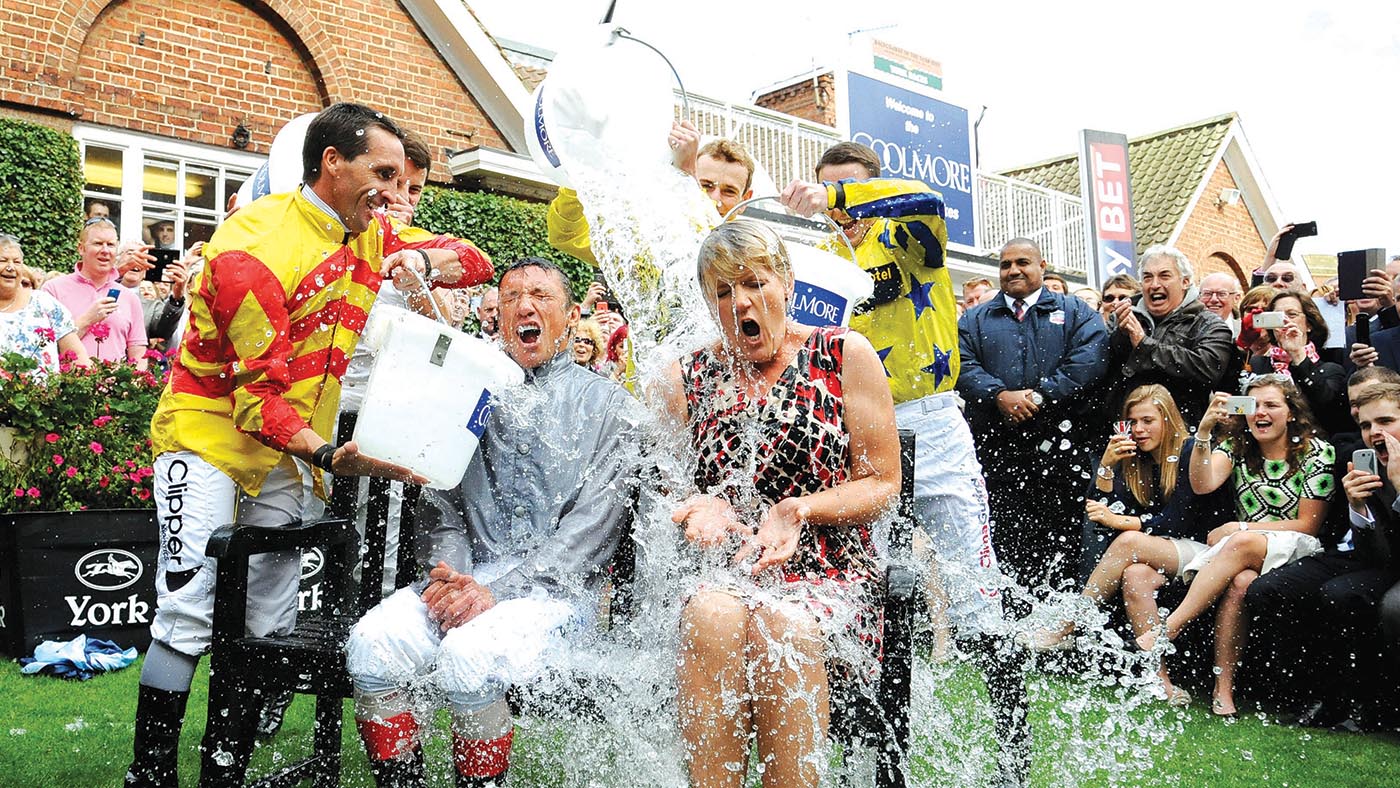
Jockey Frankie Dettori and Clare Balding take part in the Ice Bucket Challenge in aid of motor neurone disease at the 2014 Ebor Festival at York Racecourse, York.
Clare broke her collarbone – the classic jockey injury – in a fall from a pony aged two-and-a-half, and then a little later, fell off 100 times because Ian had said that was what made a real jockey.
Older still, and she was so desperate to make the weight for a race that she resorted to cutting her nails and hair in the vain hope it might make the tiniest difference. Now, she realises it was another lesson to learn.
“I was fighting really hard to do something that I wasn’t physically suitable for,” she says. “I wish I could have been naturally eight stone, but I wasn’t and I had to work really hard, so I had a very short career as an amateur jockey.
“It amuses me, I’m constantly correcting people when they say ‘former jockey’. I wasn’t – I was an amateur! It was so exciting for the short time it lasted, the thrill of riding in a race and getting the best out of a horse.”
It might have been a short career, but it was successful. She recalls a highlight partnering a “sweet horse” called Knock Knock.
“He hadn’t won a race for years and years, and suddenly I managed to win on him, at 25/1 at Kempton and then again,” she says.
“We were only once out of the first two. Then he started winning for other people because Dad said to them, ‘Just don’t touch him with whips, keep saying nice things to him, that’s what Clare does’.”
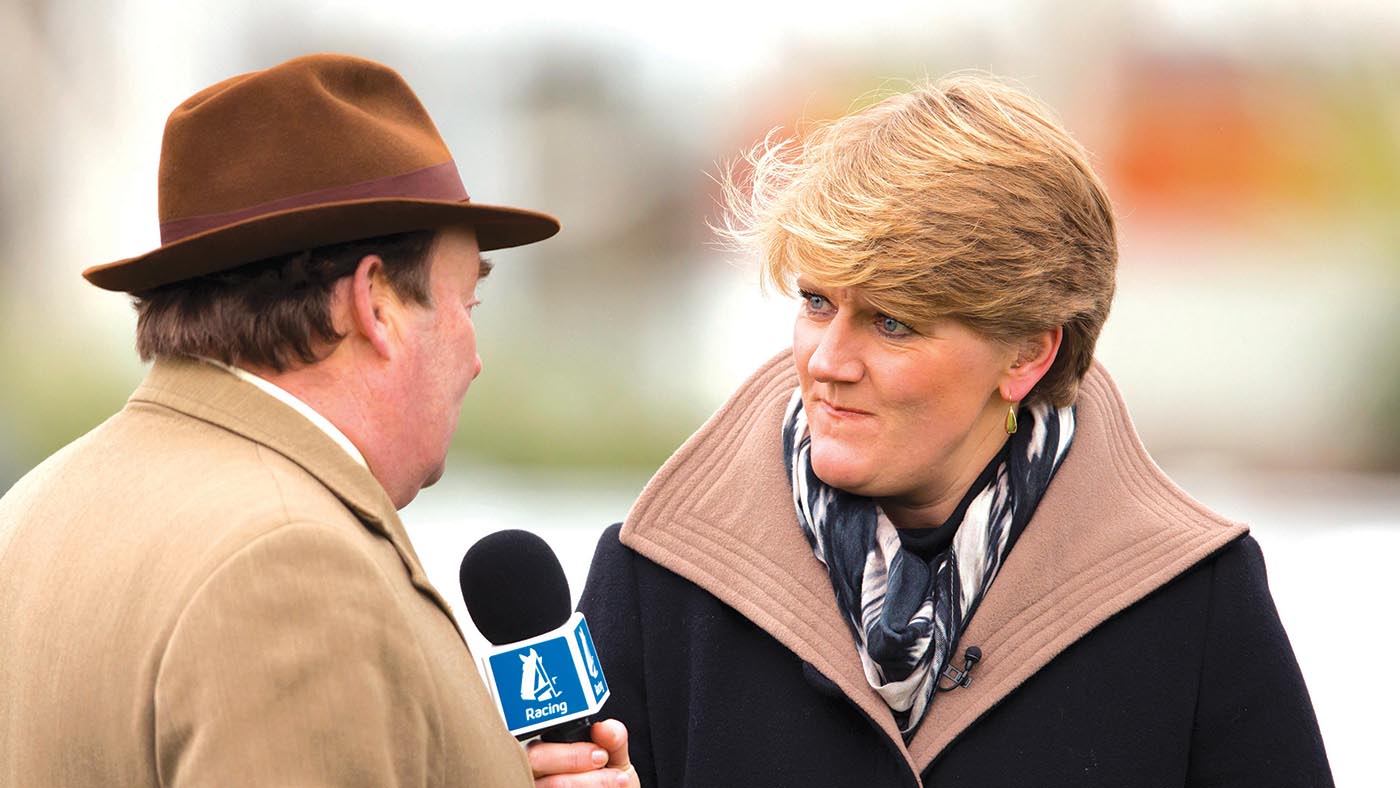
Clare interviewing National Hunt trainer Nicky Henderson
THE nervousness she felt as she was legged up was one of the reasons she knew that she was really well suited to live broadcasting; it meant that she cared, and therefore it was going to be all right. She had some useful mentors, too; BBC Radio’s former racing correspondent Cornelius Lysaght gave her her first job and impressed upon her the need to tell the story, and make people care, and then Terry Wogan.
“In terms of kindness and warmth, very few people can match Terry,” she says. “Studio managers, producers, the receptionists all loved him.”
Still, no one is immune to an early mishap; the first time Clare presented on her own, she’d written down the name of her next guest, Richard Spring MP (“I remember it now because I couldn’t remember it then”) but she couldn’t read her writing and totally fluffed it.
“As the mic was faded out, you could hear me start to say ‘Shhhh…’. My mother sent me a text saying, ‘You were going to say sugar weren’t you?’ It was the first time understanding the mic is nearly always live, therefore don’t swear.”
And what about that childhood eventing dream? Clare has a racehorse in training with her brother Andrew, and another that she’s hoping might make an eventer, though this time she’d be watching her horse compete from the safety of the sidelines. Still, the dream lives on.
● Fall Off, Get Back On, Keep Going is published on 15 April
This exclusive interview is also available to read in this Thursday’s H&H magazine (15 April, 2021)
You may also be interested in…

H&H interview: Edwina Tops-Alexander *H&H Plus*
The top-flight showjumper chats to Jennifer Donald about family values, finding her match in the great ‘Itot’ and dealing with

H&H interview: Welsh National-winning trainer Christian Williams *H&H Plus*
The Welsh National-winning trainer talks about his instinctive approach and why Potters Corner is drawing comparisons with Red Rum

H&H interview: Former Badminton media director Julian Seaman *H&H Plus*
The ebullient former media director of Badminton is eclectically talented, with a “naughty air of indiscretion”. Martha Terry meets him

H&H interview: Meet talented, young Flat jockey Tom Marquand *H&H Plus*
This young jockey has enjoyed a meteoric rise of late, claiming his his first Classic victory on home turf in

H&H interview: Racehorse trainer Andrew Balding *H&H Plus*
This year’s 2000 Guineas-winning trainer talks to Catherine Austen about his long-awaited second Classic victory, training for The Queen and


